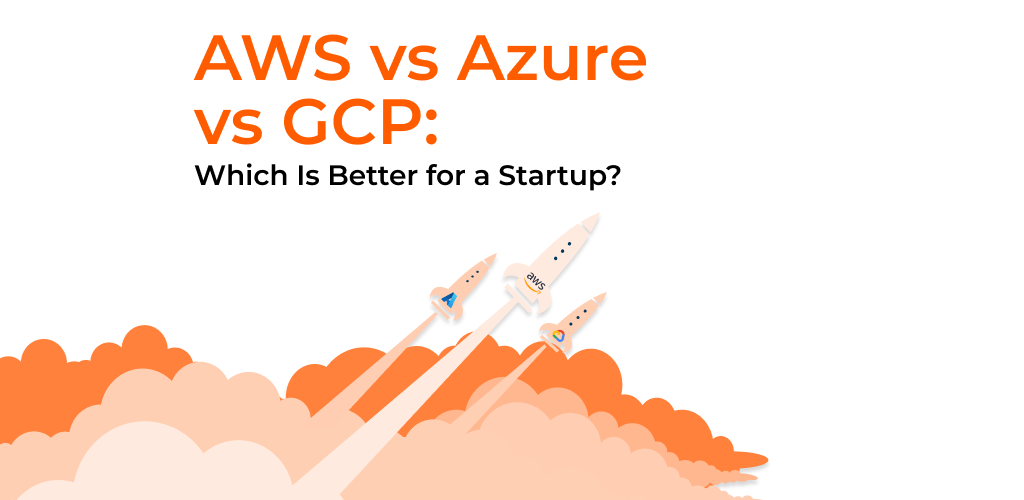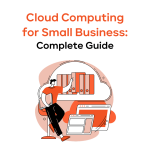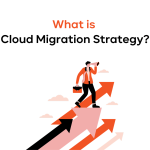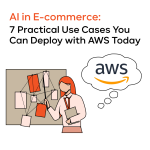Cloud technologies have already dominated the development market, offering businesses a plethora of efficient solutions. At the same time, new players, especially startups, may find it challenging to choose an initial tech stack for launching their project — and for good reason.
Choosing AWS vs Azure vs Google Cloud for startups is a matter of product growth potential, alignment with project needs, service costs, efficiency, capabilities, and ease of use.
In the following sections, we’ll analyze Google Cloud, AWS, Azure, compare their solutions, and help you select the optimal platform for your startup.
Overview of AWS, Azure, and Google Cloud for startups
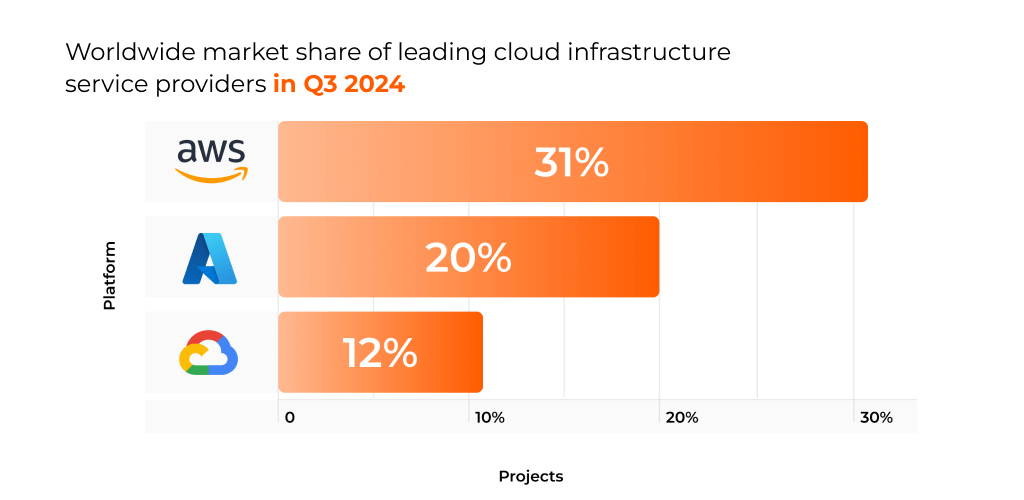
According to Statista analysts, Google Cloud, AWS, and Azure currently dominate the cloud platform market, holding a combined share of 62%. Together, they generate over half of the industry’s approximately $84 billion in revenue. So, what makes these platforms so special? Let’s take a closer look.
Amazon Web Services
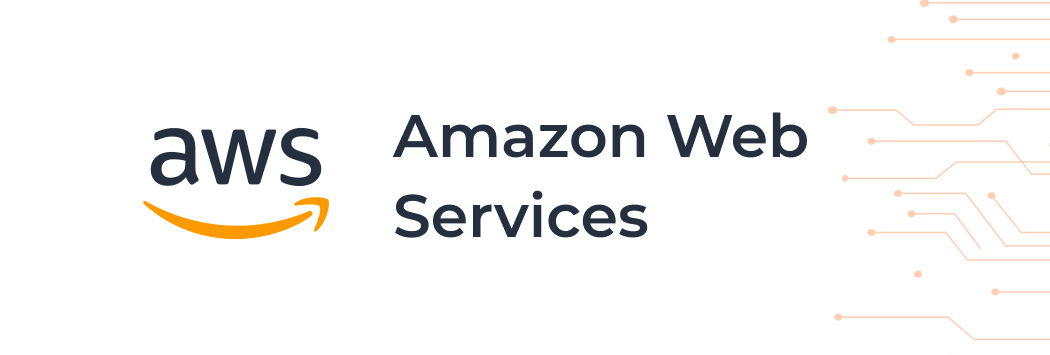
The platform was made publicly available in March 2006. The release included three main services: Amazon S3 (Simple Storage Service) for cloud storage, RDS (Relational Database Service), and EC2 (Elastic Compute Cloud).
Initially, the solution was positioned as a cloud for small stores and web applications, but it quickly scaled up to become an ultimate product. At present, the platform supports products across various types and industries, contributing to its 31% share of the cloud services market. By the way, according to the HG Insights report, by the end of 2023, over 1.8 million startups had been launched on the platform.
Microsoft Azure
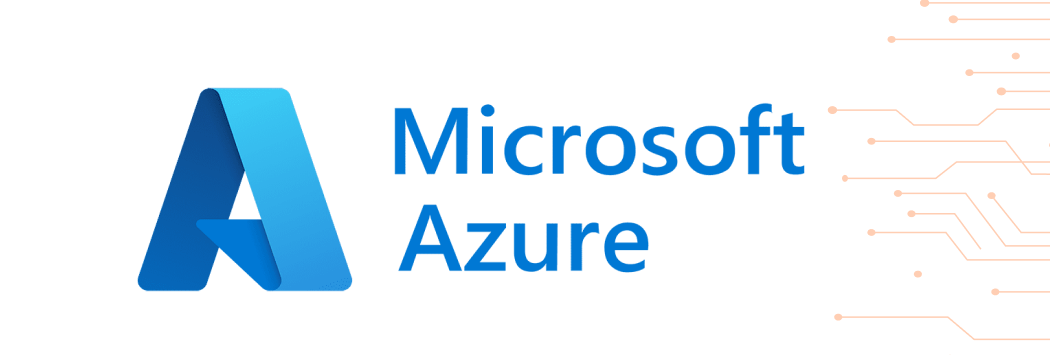
The 2010 release forced Amazon to step up. Initially, Microsoft Azure offered a limited range of services but was already a strong contender for the title of a leading cloud platform. At the time of launch, the main Azure services were: .NET Framework 4, OS Versioning, Content Delivery Network (CDN), and Microsoft Azure Service Bus.
The platform has now transformed into its fourth generation and includes about 600 services that meet the needs of various types and scales of businesses. Currently, the platform holds about 20% of the market share.
Google Cloud
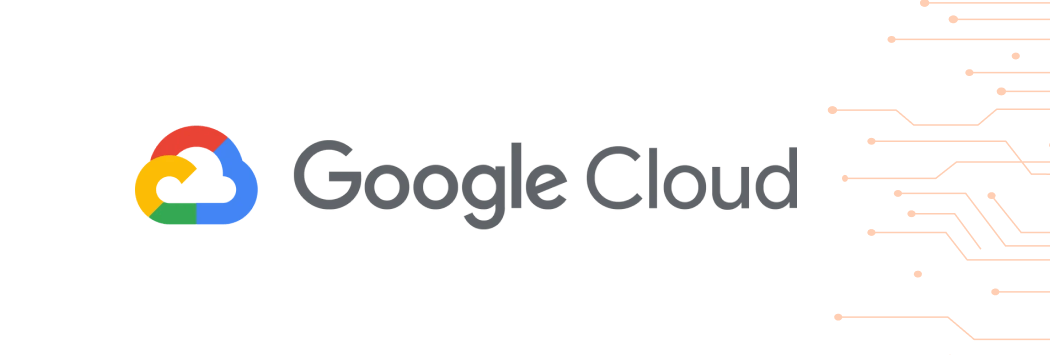
Google Cloud made its debut in the cloud platform market in 2011 and, within a decade, secured its position among the top three solutions in the industry. Right from the start, it provided users with a diverse array of services, such as App Engine, Compute Engine, and Cloud Run. Today, the product includes over 100 different types of services and solutions for businesses.
Currently, Google Cloud ranks third among cloud platforms, holding 12% of the market share. This is largely due to its flexibility and the control it offers over projects deployed within its ecosystem.
Benefits of cloud computing for startups
Before we dive into the direct comparison of AWS vs Azure vs Google for startups, let’s explain why local solutions are currently unprofitable compared to cloud platforms, especially for startups.
Here are a few important advantages of cloud solutions:
- Cost efficiency. Instead of investing in expensive hardware and software, startups can pay only for the resources and services they use.
- Scalability and flexibility. With cloud platforms, startups can instantly scale their infrastructure up or down, adjusting their capabilities and costs to meet current needs.
- Information security. This encompasses encryption of data, access management, and routine security updates. It also involves isolating individual projects to protect information, experiments, etc.
- Access to technologies and tools. Cloud platforms provide startups with innovative solutions like AI, machine learning, Big Data, and systems built around these technologies.
- Relevance. Platform updates are fully handled by the service provider, so the startup’s technical staff doesn’t need to take additional steps to update services, install new packages, and so on.
- Optimized operations. Cloud tools allow startups to automate various processes, increase efficiency, and focus more on their core business activities rather than managing IT.
This is a fairly conceptual list of the benefits of using cloud platforms for deploying the technical infrastructure of startups. However, even this is enough to understand that outdated local systems are a thing of the past. So, on this positive note, let’s move on to the core of the comparison – AWS vs Azure vs Google for startups.
_____________________________________________________________________________
Unlock your startup’s potential with AWS
Take advantage of AWS services and build a robust cloud infrastructure that scales with your business. Start your journey today with our expert consultation!
_____________________________________________________________________________
Key features comparison
When considering Google Cloud, AWS, Azure, it can be stated that all three platforms have their advantages and disadvantages, and are optimal for different industries. Therefore, let’s start with a brief comparison of key features and service characteristics. We will then focus on an overview of GCP and AWS vs Azure for startups, specifically in terms of their alignment with different project types, budgets, and more.
In general, the comparison will include the following aspects:
- Pricing models and startup benefits
- Industry prospects
- Ease of deployment, use, and maintenance
- Scalability and performance
- Security and compliance
But we will cover these aspects later; for now, let’s take a closer look at each platform: Google Cloud, AWS, Azure.
AWS
The AWS platform boasts the following features:
- Elastic Compute Cloud (EC2). A service for creating, configuring, and launching cloud servers, emulating hardware, and managing the scaling of computing power according to current needs.
- Amazon RDS. Used for relational databases, DynamoDB for NoSQL solutions, and Redshift for data warehouses. It can run databases via an API call without prior setup.
- Lambda. An operational environment for running code on computing infrastructure, logging, and automatic scaling of resources.
- Simple Storage Service (S3). A scalable object storage service for data backup and archiving.
- AWS offers a set of developer tools such as AWS CodeBuild, CodeDeploy, and CodePipeline, which significantly speed up and optimize standard development processes.
- Amazon CloudFront. A CDN service that securely delivers media, data, and APIs to clients worldwide. Due to an expanded network and distributed data centers, data transfer speeds are extremely high, with almost no latency.
In addition, AWS offers extra benefits, such as access to an extensive service catalog and full integration with other Amazon products and solutions.
Microsoft Azure
For Azure, the following features are notable:
- Virtual Machines (VMs) in Azure. The cloud equivalent of local working environments. Computing power can be increased or decreased by simply adjusting settings via the GUI.
- Azure Storage. A scalable cloud storage solution that can handle all types of data and be used for storing project files, including content, databases, and more.
- Azure Functions. A serverless operational infrastructure that allows you to run code or code snippets in the cloud environment without providing system access.
- Azure CDN. A data distribution system using Microsoft’s global network. It can cache information from Azure Storage and deliver it when needed.
- Azure HDInsight. A cloud service for processing large volumes of real-time data, typically used for analytical purposes.
- Azure Cosmos DB. A globally distributed, multi-model database service. It is used for managing information at scale.
- There are other developer tools available, including integration with Visual Studio and Visual Studio Code.
In the comparison of AWS vs Azure for startups, the latter offers full compatibility with other Microsoft solutions. This means integration with Office 365, Teams, and other products, on the basis of which ERP, EMS, and similar systems can be built.
Google Cloud Platform
As for GCP, it offers the following unique features:
- Compute Engine. Provides variable computing power in the cloud, enabling quick scaling or even relocating virtual machines as needed.
- GCP database services include:
- Cloud SQL for relational databases.
- Firestore for NoSQL document storage.
- BigQuery for data storage.
- Cloud Storage. A distributed storage solution for physical files across different servers with logical address chains and pools. It’s a scalable cloud environment whose size can be adjusted as needed.
- Cloud Functions. A system for responding to events based on predefined algorithms, invoking functions according to needs, and operating data from databases.
In the AWS vs Azure vs Google for startups, GCP offers fairly robust capabilities for deploying solutions based on AI, machine learning, and Big Data analytics. This platform is also the optimal choice if the team is using products from the Google Workspace ecosystem for their work.
Pricing Models for Startups
When choosing between Google Cloud, AWS, Azure, the cost of using the platforms and their individual services required by startups will be an important factor.
All three options have free functionality, trial periods, and different pricing models, which establishes parity in the pricing issue of AWS vs Azure vs Google for startups.
Startups that focus on using cloud platforms can also expect additional preferences, including:
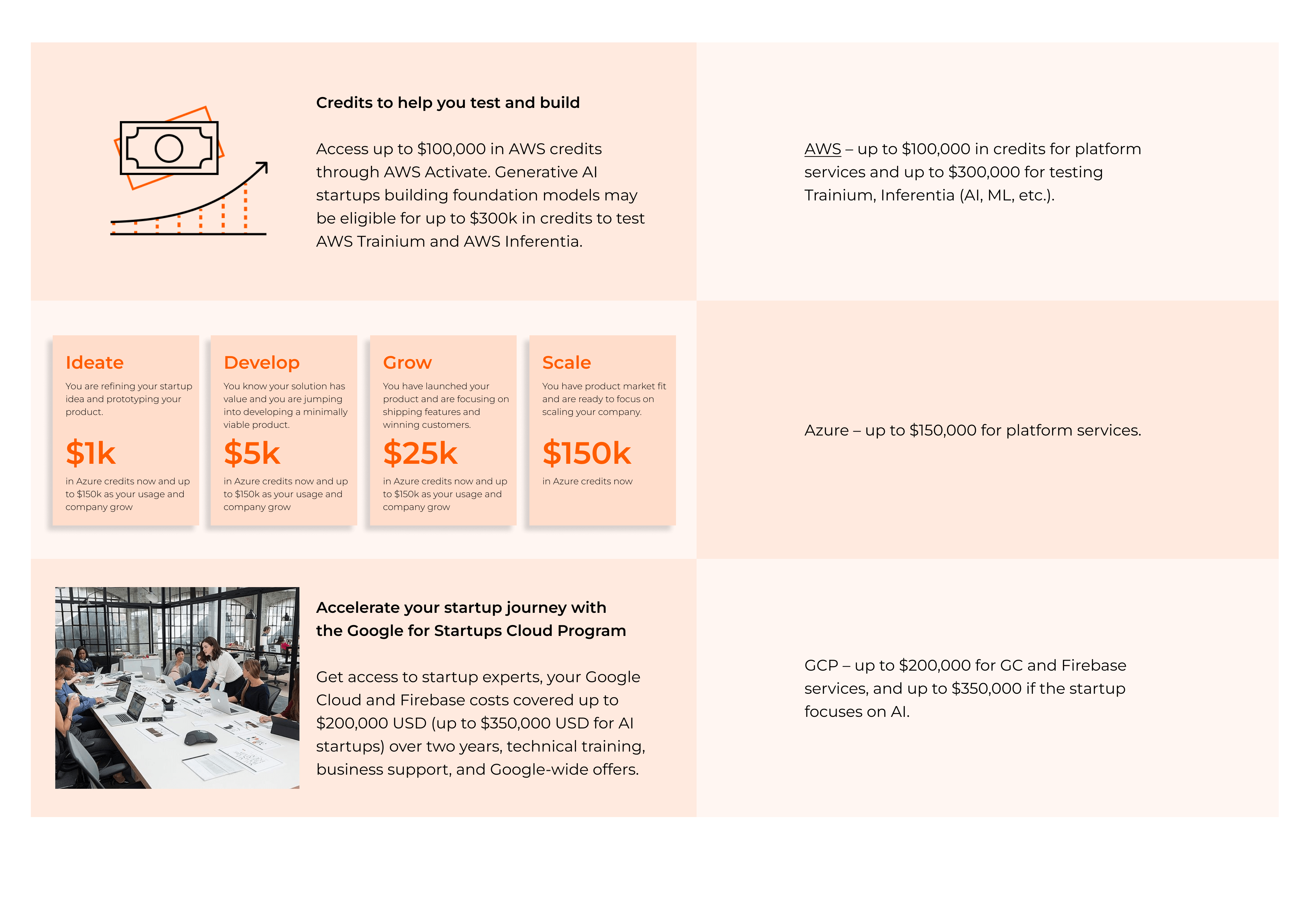
All platforms provide free service tiers for testing and more affordable startup launches, as well as different pricing models and discounts for customers.
However, in the comparison of AWS vs Azure vs Google for startups, GCP stands out as the leader in supporting startups at the early stages of development, which can be advantageous for companies with limited budgets. At the same time, AWS reveals its potential in the long term, surpassing competitors both in capabilities and cost-efficiency.
AWS vs Azure vs GCP: for which industry is it suitable?
In terms of meeting industry needs, Google Cloud, AWS, Azure have similar potential. However, it’s worth noting that each platform has strengths that shine in specific niches. Example:
| Platform | Niches | Why is it optimal? |
| GCP | Retail, healthcare, media companies, and sectors where deep analytics, Data Lakes, and Big Data are needed, including AI/ML, etc. | The most advanced AI-based toolset and continuous technological improvements to the platform. |
| Azure | Government institutions, healthcare systems, finance, and organizations with implemented Microsoft tools. | Complete integration of the Office 365 and Teams ecosystem, significant potential for automating processes related to data processing. |
| AWS | Technology companies and startups, e-commerce, financial services, and gaming. | The widest range of services and tools for scaling. |
Remark: AWS may offer a much deeper and more precise toolkit, but its use requires a certain level of expertise, which also impacts the choice between GCP, AWS vs Azure for startups.
Ease of use and onboarding for startups
In the AWS vs Azure vs Google for startups battle, GCP is the clear favorite in terms of ease of deployment and setup. This platform is the most beginner-friendly and features a versatile GUI with comprehensive documentation for quickly launching infrastructure.
Azure comes in second, still fairly user-friendly for teams without engineering experience.
Despite its versatility and depth, AWS ranks third due to its outdated platform interface and high entry threshold. However, AWS has one of the largest user bases, so the chances of receiving help on specialized forums like GitHub are higher.
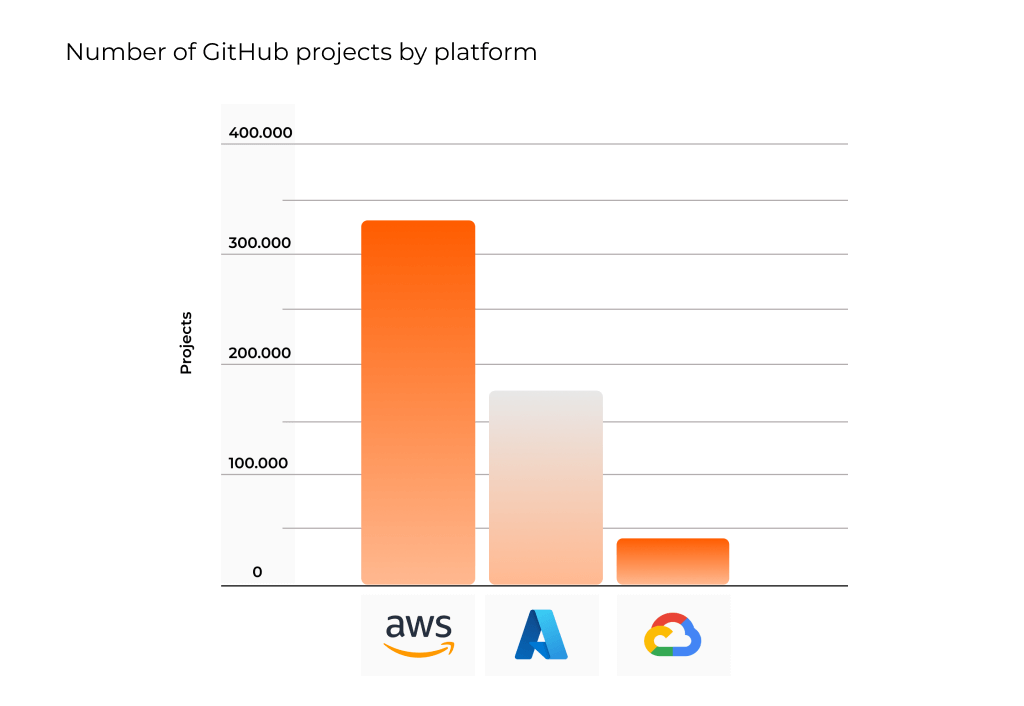
In defense of this solution, it can be said that in terms of manageability, it surpasses the other market players.
AWS vs Azure vs Google Cloud: scalability and performance
When it comes to comparing Google Cloud, AWS, Azure in terms of performance and scalability, we can see almost parity in the results. Here are some facts about the platforms that better describe their potential than words:
| AWS | 39 geographic regions.
123 availability zones. 700+ points-of-presence. |
| Azure | 60+ cloud regions.
300+ data centers globally. 192 edge locations. |
| GCP | 41 cloud regions globally.
124 zones for high availability. 202 edge locations. |
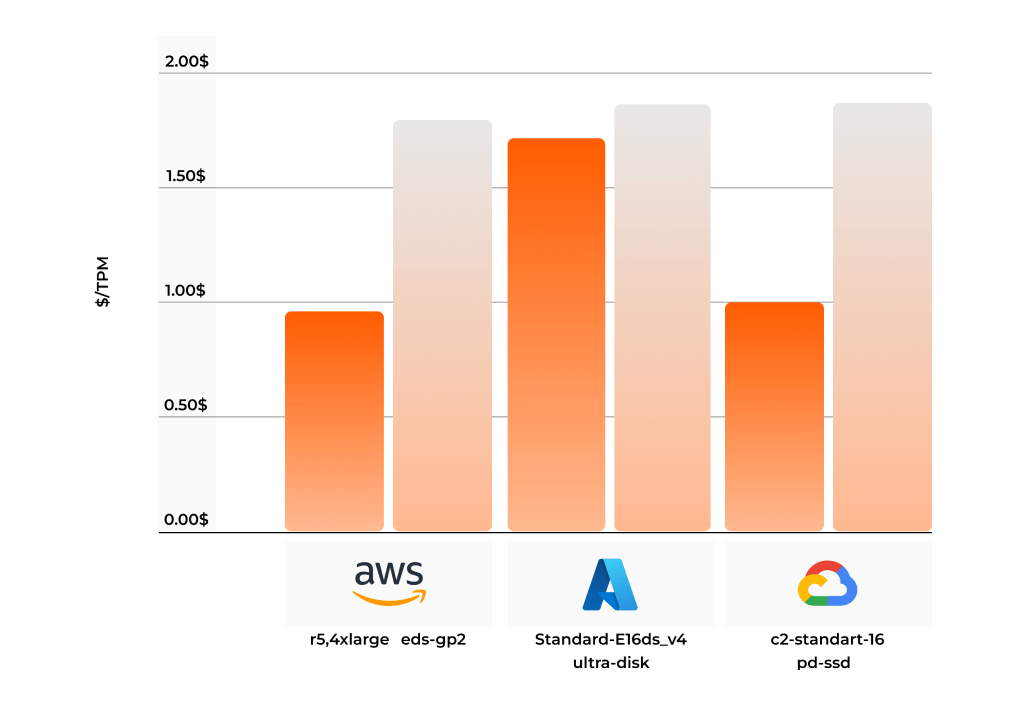
Thus, AWS is the leader in terms of scalability and performance.
AWS vs Azure vs Google: security and compliance
In terms of security features, AWS vs Azure vs Google for startups, all options show excellent results. Specifically:
| Feature | AWS | Azure | GCP |
| Identity Management | AWS IAM allows secure access to AWS services and resources. | Azure Active Directory offers identity and access management solutions for Microsoft services. | Cloud IAM allows precise control over who has access to specific resources. |
| Network Security | AWS VPC allows resources to be run in an isolated virtual network. | Azure Virtual Network ensures secure data exchange between resources and other networks. | Google Cloud VPC provides networking features for Google Cloud resources. |
| Data Encryption | AWS provides encryption for data both at rest and during transit. | Azure offers data encryption at rest and during transmission using various methods. | By default, Google Cloud encrypts data at rest and provides encryption for data in transit. |
| Threat Detection | AWS Shield and WAF defend against DDoS attacks and web-based threats. Amazon Inspector provides automatic security assessments. | Azure Security Center provides advanced threat protection in hybrid cloud environments. | Google Cloud Armor offers tools for application protection. |
| Compliance and Certification | ISO 27001, HIPAA, FedRAMP, and GDPR for data protection. | ISO 27001, HIPAA, FedRAMP, and GDPR. | ISO 27001, HIPAA, FedRAMP, and GDPR. |
Accordingly, Google Cloud, AWS, Azure are all secure platforms that comply with the majority of industry standards.
Who is the best cloud provider for startups?
In fact, in the battle between GCP, AWS vs Azure for startups, there is no clear winner. Each platform has its strengths and weaknesses, so it can be used to build a startup’s infrastructure.
- GCP may be the best option for beginners without a technical background or startups focusing on AI.
- Azure is optimal for products that use the potential of the Microsoft ecosystem.
- AWS is essentially a versatile platform with significant long-term potential for service and infrastructure scaling. However, deep knowledge and sufficient experience are required to work with it.
Remember, there is no one-size-fits-all solution that covers all startup or established business needs. Therefore, you may need qualified help to choose the right initial infrastructure.
How can IT-Magic help?
The IT-Magic team is made up of experts in building high-performance solutions based on AWS. We offer consulting and service support for startups that are just beginning to build cloud infrastructure or are looking for ways to scale and optimize it efficiently.
Choosing between AWS vs Azure vs Google for startups?
Let IT-Magic help you build a solid cloud strategy. We will guide you through the process and ensure maximum efficiency and cost-effectiveness for your startup with AWS.
FAQ
Which cloud platform is best for startups?
It depends on the type of startup, its needs, and budget. When choosing between Google Cloud, AWS, Azure, one must also consider the future scalability requirements.
Which cloud provider offers better machine learning and AI tools for startups?
Currently, GCP may be the simplest solution for building infrastructure for AI/ML startups. At the same time, it is AWS that offers innovative AWS generative AI services, which will allow for fast and efficient development and scaling of products of this type.
What factors should startups consider when choosing between AWS, Azure, and Google Cloud?
The startup’s needs, the urgency of infrastructure deployment, additional services and products like Kubernetes, as well as the experience and skills of the technical team.
What are the long-term cost-saving opportunities on AWS, Azure, and Google Cloud for startups?
Google Cloud, AWS, Azure offer credit programs and free trial periods for accessing services. When it comes to long-term costs, you can compare identical configurations before making a final choice in favor of one platform.
Which cloud provider has the most extensive developer resources for startups?
AWS can offer the widest range of tools and services for deep control of a startup’s infrastructure. However, this is only true if you collaborate with professionals of this platform, such as IT-Magic.
